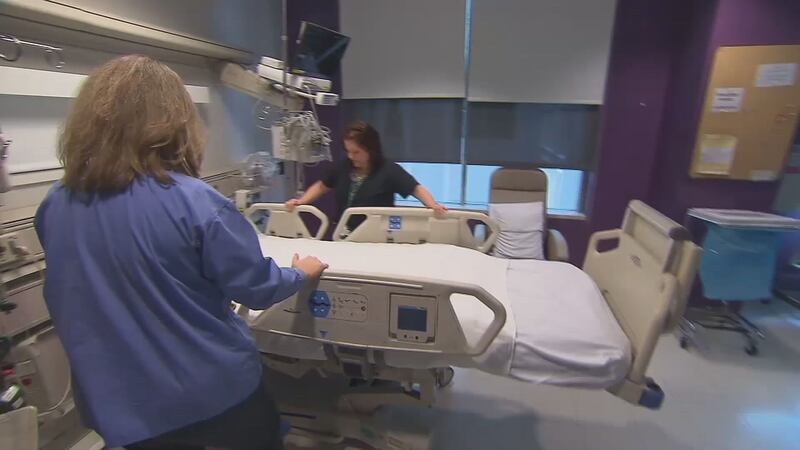TACOMA, Wash. — A dispute over damaged mattresses is pitting a Tacoma hospital against some of its nurses and their union.
The Washington State Nurses Association says nurses complained months ago that damaged mattresses at St. Joseph Medical Center were oozing fluids. The nurses wanted the mattresses to be replaced, but say it’s not happening fast enough.
The hospital blames supply chain issues for the delay in replacing beds, and said they have been ordered and are arriving as they become available.
The issue was discovered in the hospital’s labor and delivery unit.
Caring for hospital beds and mattresses has come into focus since the start of the pandemic, when hospitals struggled to keep up with the flow of patients and supply of hospital beds.
The WSNA sent out a statement this week saying damaged mattresses with micro-tears are a hazard because they can leave beds vulnerable to absorbing blood and other fluids from patients.
The hospital says it regularly inspects all beds after every use when they are cleaned and disinfected, and mattresses that do not meet safety standards are immediately removed from service.
The union contends that nurses informed the hospital about the issue in September, and while some mattresses were replaced, others were repaired instead.
A St. Joseph spokesperson said patching is an interim measure until replacement beds can be delivered.
Ruth Schubert is the communications and marketing director for the WSNA. She admitted it’s not a situation that any potential patient wants to hear about.
“At the least it’s kind of gross. At the worst, it could present a biohazard to patients. Now, we don’t have any evidence that any patient actually came in contact with the blood or body fluid that was absorbed in these mattresses, but it remains a concern. We don’t have any evidence that patients did not come in contact with it either,” said Schubert.
The nurses union says it filed a complaint with the Washington State Department of Health. On its website, the Food and Drug Administration has guidance saying hospitals should remove any damaged, worn or visibly stained hospital bed mattress. The FDA guidance also says to immediately replace any hospital bed mattress that has stains, damage or wear to reduce the risk of infection to patients.
The WSNA says the problem of compromised mattresses was first reported on Sept. 8.
The union represents the nurses at St. Joseph Medical Center and made its position clear: it wants to see beds with patches or repairs be removed and replaced.
The hospital said “an approved protocol to patch mattresses was put into place only for situations when it is safe and appropriate to do so, based on the level of damage. Any mattresses that are damaged and therefore unable to be safely patched are immediately removed from the floor.”
In its complaint to the Washington DOH on Oct. 7, WSNA said, “Patching applied to labor and delivery mattresses (as a stop gap repair measure) is not secure and is rolling up around the edges … Without a proactive system to address bed/gurney mattresses, compromised beds could be in every department at SJMC, potentially exposing immunocompromised and all patients to infectious blood and body fluids.”
WSNA also says damaged mattresses could be an issue at other hospitals.
“This is a patient safety issue that we have been raising the alarm on for two months,” said Jayson Dick, WSNA director of labor strategies. “In order to keep patients and staff safe, any compromised mattresses need to be replaced.”
St. Joseph Medical Center President Jennifer Schomburg released the following statement about the issue:
“St. Joseph Medical Center takes the highest responsibility to ensure the safety and quality of our equipment for our patients. Any mattresses that are compromised are immediately taken out of commission and not used for patient care. As a standard process, we regularly inspect all beds after every use when they are cleaned and disinfected, and immediately remove any mattresses from use if they do not meet safety standards.”
©2022 Cox Media Group








